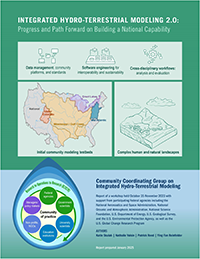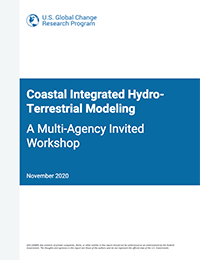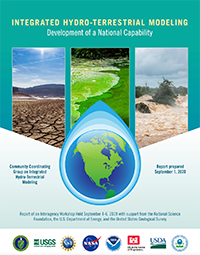Integrated Hydro-Terrestrial Modeling (IHTM) aims to advance national and regional capabilities and infrastructure for multiagency data and simulation products, providing the basis for understanding and managing complex water-human systems. Mobilized by U.S. federal leadership and closer interagency coordination across sectors, IHTM is evolving from a conceptual framework toward actionable use cases at national and regional scales.
Beginning with a workshop report authored by a Community Coordinating Group on IHTM in 2020, “community” continues to be an integral element of the IHTM framework. Subsequent Coastal IHTM (2020) and IHTM 2.0 (2023) workshops have continued to identify emerging capabilities and research gaps. One key takeaway from the 2023 workshop was the need for a community of practice (CoP) with a culture of sharing concepts, resources, and applications. The IHTM CoP Portal responds to this need as a central hub for sharing resources and events, playing a crucial role in connecting our nation’s water challenges across governmental, non-profit, academic, and private organizations.
IHTM 2.0 Workshop (2023)
 In fall 2023, USGCRP agencies and their partners jointly held a second workshop on Integrated Hydro-Terrestrial Modeling (IHTM 2.0) for U.S. federal and non-federal scientists and managers in Reston, Virginia, aiming to advance community modeling and integrated water resources management capabilities following open science principles.
In fall 2023, USGCRP agencies and their partners jointly held a second workshop on Integrated Hydro-Terrestrial Modeling (IHTM 2.0) for U.S. federal and non-federal scientists and managers in Reston, Virginia, aiming to advance community modeling and integrated water resources management capabilities following open science principles.
This workshop focused on developing national and regional testbeds that employ state-of-the-art modeling approaches to explore gaps and opportunities for improving the representation and extensibility of hydrologic processes and modeling across scales. Proposed integrated modeling testbeds span across the Mid-Atlantic, Upper Colorado River Basin, Great Lakes, and Gulf Coast/Mississippi regions, exploring issues such as water extremes, water quality, water use, and urbanization.
- Workshop Report: Second Integrated Hydro-Terrestrial Modeling (IHTM 2.0) Workshop
- USGCRP Federal Summary
Coastal IHTM Workshop (2020)
 In November 2020, a multiagency Coastal Integrated Hydro-Terrestrial Modeling (C-IHTM) workshop series was convened online. With five sessions over five days, the workshop focused on the challenges of modeling and evaluating coastal landscapes of coevolving human and natural systems subject to influences and stressors. Areas of focus included extreme weather events, sea-level rise, natural and anthropogenic disturbances, and other impacts of climate change.
In November 2020, a multiagency Coastal Integrated Hydro-Terrestrial Modeling (C-IHTM) workshop series was convened online. With five sessions over five days, the workshop focused on the challenges of modeling and evaluating coastal landscapes of coevolving human and natural systems subject to influences and stressors. Areas of focus included extreme weather events, sea-level rise, natural and anthropogenic disturbances, and other impacts of climate change.
The workshop was jointly planned and undertaken by the federal interagency C-IHTM Coordinating Group jointly planned and undertaken the workshop within the U.S. Global Change Research Program (USGCRP) and the DOE’s MultiSector Dynamics (MSD) research community. The five-day virtual workshop included robust participation from a wide range of science and engineering research communities.
- Workshop Report: Coastal Integrated Hydro-Terrestrial Modeling: A Multi-Agency Invited Workshop. U.S. Global Change Research Program
IHTM 1.0 Workshop (2019)
 An interagency workshop on “Integrated Hydro-Terrestrial Modeling: Development of a National Capability” was held at the National Science Foundation (NSF) headquarters in Alexandria, Virginia, in September 2019, led jointly by the NSF, the U.S. Department of Energy (DOE), and the U.S. Geological Survey (USGS), with broader interagency support provided through an interagency steering committee.
An interagency workshop on “Integrated Hydro-Terrestrial Modeling: Development of a National Capability” was held at the National Science Foundation (NSF) headquarters in Alexandria, Virginia, in September 2019, led jointly by the NSF, the U.S. Department of Energy (DOE), and the U.S. Geological Survey (USGS), with broader interagency support provided through an interagency steering committee.
This workshop provided a venue to bring together representatives of water-related agencies and their scientific partners (including university researchers) to initiate and refine a vision for national Integrated Hydro-Terrestrial Modeling (IHTM) and data infrastructure and to advance ideas that would promote that vision’s development.